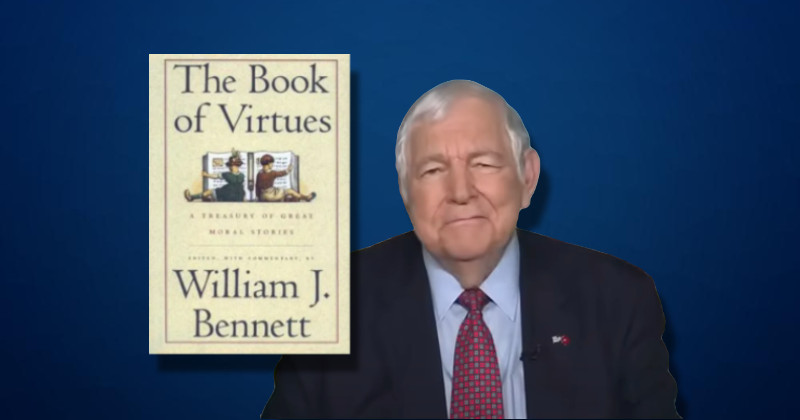We are a nation divided. So it seems, and so we are told. Again and again.
Americans disagree on abortion. We disagree on what’s important, on what is and isn’t a “crisis.” We disagree on the types of energy our nation ought to create and use. We disagree on the rights of parents and of minors; what the First and Second Amendments mean; how to deal with our southern border; and whether or not to support Ukraine in its war with Russia.
Back when an entrepreneur named Jeff Bezos was about to launch an internet platform to sell books, when the Soviet Union was again becoming Russia, and when early warning signs were appearing that a “culture war” had begun, a former U.S. Secretary of Education authored “The Book of Virtues” – and sold millions of copies.
William Bennett saw that America was coming apart in the early 1990s. He saw the troubling indicators, from the weakening of the family and falling test scores in schools to a changing economy. These warnings had many questioning the American future. So the former educator and policymaker took on the challenge of giving us a roadmap to fixing what was broken. His goal was to find things that united us as a nation by reminding us of the virtues that had been seen as important – even necessary – for centuries.
Bennett wrote “The Book of Virtues” – and later its companion versions for children and teenagers – because he believed that there were virtues that we all could embrace. The book is still so highly regarded that Bennett – along with his wife, Elayne – issued a 30th anniversary edition in 2022.
Though some of the stories in the updated edition are different – some removed, some added – the book’s virtues were not changed. To the timeless accounts from classics like the Bible and the tales of Aesop, the Bennetts added stories from relatively recent pillars of virtue – Mother Theresa, Navy Seal Michael Murphy (a posthumous Medal of Honor recipient who died saving his comrades in Afghanistan), and the heroes of 9/11. When asked by City Journal’s Robert Pondiscio if he had considered changing the virtues, Bennett responded in the most William Bennett way: “C.S. Lewis said you could no more invent a new virtue than a new color.”
Each chapter covers a virtue – what it is, why it’s important, and why it matters – through stories, tales and commentaries: Responsibility. Courage. Compassion. Loyalty. Honesty. Friendship. Persistence. Hard work. Self-discipline. Faith.
Then and now, Bennett’s Virtues struck a nerve. The response of readers has been overwhelmingly positive. The original book rates 4.8 stars on Amazon, while the 30th edition garners 4.7 stars.
Some on the left side of the political spectrum were dismissive of this “national lecture.” But 30 years ago, unlike today, many corporate media commentators recognized the book’s impact. In 1993, Newsweek put Bennett on its cover along with Peggy Noonan and Hillary Clinton, labeling them “virtuecrats” fighting America’s moral decline. Even critics in the New York Times and Baltimore Sun said that the book belonged in schools and libraries.
Americans are clearly more divided today than they were in 1992. But can we find a national consensus – if not on politics, then on the fact that certain core virtues matter? Bennett has given us a handbook for doing so. He is imperfect himself and acknowledges it. He urges us all to aim higher and to teach the next generation.
We may not agree on policies or the people or institutions we can trust. But most of us do agree that things are spinning out of control. Perhaps we can start by acknowledging that too much is coming apart too fast, that we are fighting over too many things, and that our conflicting ideologies are putting us on a collision course.
If we can agree on how we ought to conduct ourselves and how we want our children to grow up and the values that they should embrace, that would be an important start. Timeless virtues offer us that opportunity.
We are responsible for our own behavior, and we have a responsibility to our families, even to our community and our nation. We can control our own behavior. We can and should exercise self-discipline, including the discipline to be respectful of others, even when we disagree. While not ignoring the challenges that many face, we should put our focus back on persistence and hard work and overcoming adversity.
Can most of us agree on these virtues? William Bennett’s 30-year-old book, reflecting on centuries of thoughts and ideals, offers us a roadmap.
This article was originally published by RealClearPennsylvania and made available via RealClearWire.










